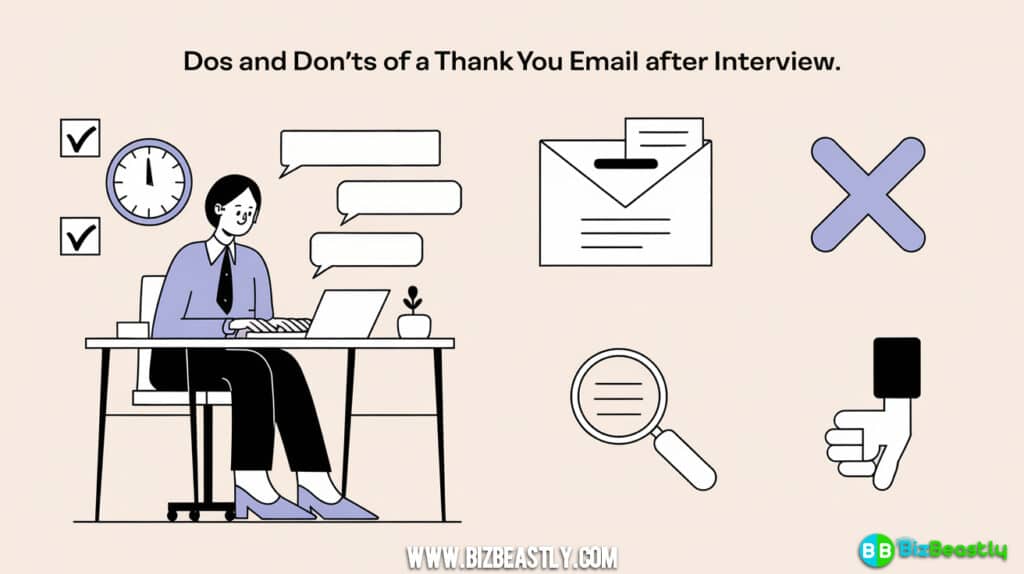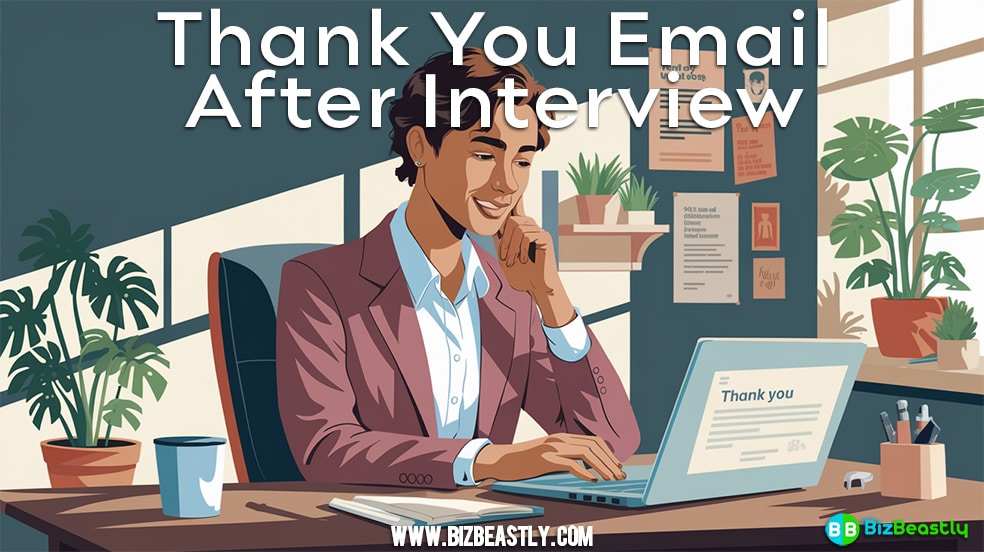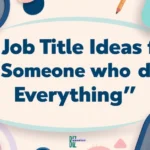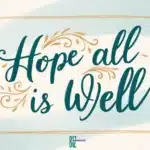The job interview process doesn’t end when you leave the interview room. One of the most impactful steps you can take afterward is sending a thank you email after interview. This simple gesture, though often overlooked, shows appreciation, reinforces your interest in the position, and keeps you memorable in the mind of the interviewer. In this guide, we’ll cover why a thank you email matters, tips on crafting it effectively, and example templates to help you leave the best possible impression.
Let’s get started on crafting an impactful thank you email after interview that will boost your chances of landing the job.
Why Sending a Thank You Email After Interview Matters
First, let’s talk about why this step is so essential. A thank you email after interview serves multiple purposes, all of which can help your application stand out.

- Shows Professionalism and Courtesy: Above all, a thank you message demonstrates that you value the time the interviewer dedicated to meeting with you. This simple act of appreciation can set a professional tone and lay the foundation for a positive relationship.
- Reinforces Interest in the Role: In addition, an enthusiastic thank you email reaffirms your interest in the position, showing the hiring team you’re truly engaged and committed to joining their team.
- Keeps You Fresh in the Interviewer’s Mind: Further, this message can serve as a reminder of your unique skills, experience, and the value you’d bring to the role. In a competitive applicant pool, a memorable thank you email can make a lasting difference.
- Addresses Follow-Up Points: Finally, a thank you email offers an ideal opportunity to bring up any additional points that may have arisen during the interview. This could include specific projects, goals, or questions that highlight your qualifications and enthusiasm for the job.
Timing and Purpose of a Thank You Email After Interview
Now that we’ve covered why a thank you email is essential, let’s talk about timing. To maximize the impact, aim to send your thank you email after interview within 24 hours of the meeting. This prompt response shows respect for the interviewer’s time and signals a high level of interest in the role.
Purpose of the Thank You Email After Interview
Your thank you email should go beyond a simple note of gratitude. Instead, think of it as an opportunity to accomplish several things at once:
- Reiterate Your Enthusiasm: Emphasize your excitement for the role and the company.
- Highlight Key Points from the Interview: Mention specific topics discussed to show you were engaged and attentive.
- Reinforce Your Fit for the Role: Remind them briefly of your relevant skills and experiences that make you the right fit for the job.
- Provide Additional Information: If any important questions were left unanswered during the interview, use this opportunity to clarify or expand on those points.
By focusing on these areas, you can make your thank you email more impactful and valuable to the hiring team.
Crafting the Perfect Thank You Email After Interview
When structuring your thank you email after interview, it’s essential to keep it concise, clear, and meaningful. Here’s a simple structure to help guide you.

Subject Line
Your subject line is the first impression of your thank you email after interview, so it should be clear, polite, and direct. Avoid vague phrases like “Thank You” alone, as they can easily get overlooked. Instead, choose a specific line that communicates gratitude and context, ideally with your name or the job title. This small detail makes it easier for the interviewer to recognize your email and recall your conversation.
Here are some examples that balance friendliness with professionalism:
- “Thank You for the Interview Opportunity – [Your Name]”
Direct and appreciative, this line lets the interviewer know right away that this is a thank you email related to the recent interview. - “Appreciation for Our Discussion Regarding the [Job Title] Role”
Adding “appreciation” gives this subject line a sincere tone, while mentioning the job title keeps the email relevant and recognizable. - “Thank You for Meeting with Me to Discuss [Job Title]”
Ideal for a one-on-one setting, this subject line’s personal touch emphasizes both gratitude and the job title discussed.
A well-worded subject line like these examples will increase the chances of your email being noticed and set a positive tone from the start.
Greeting
After crafting a clear subject line, the next step in your thank you email after interview is to start with an appropriate greeting. Addressing the interviewer by name might seem minor, but it makes the email feel more personal and genuine. Using their name adds a touch of warmth and professionalism that sets your email apart from more generic follow-ups.
For example, beginning with “Dear [Interviewer’s Name]” is formal yet friendly, while “Hello [Interviewer’s Name]” can suit a more relaxed interview setting. This small detail not only shows you remember the interviewer’s name but also demonstrates that you value the interaction enough to make the email feel personalized.
Examples:
- “Dear [Interviewer’s Name],”
- “Hello [Interviewer’s Name],”
Remember, your greeting sets the tone for the rest of the email, making it feel respectful, warm, and thoughtful from the start.
Opening Statement
Opening your thank you email with a sincere expression of gratitude immediately sets a positive tone, demonstrating respect for the interviewer’s time and effort. By acknowledging their consideration right from the start, you create a courteous impression that shows you genuinely value the opportunity. This thoughtful beginning not only establishes warmth but also signals your appreciation for the chance to connect with them.
Start by thanking them specifically for the interview, mentioning the position, and referencing something memorable from your conversation. This not only reinforces your attentiveness but also builds a personal connection. For example, if you discussed a project or goal, referencing it here shows your interest and engagement.
Example:
“Thank you for the opportunity to interview for the [Job Title] position. I enjoyed our conversation about [specific topic or project] and appreciate the insights you shared on how your team is tackling [related goal or challenge].”
This opening conveys both appreciation and enthusiasm, reminding the interviewer of your conversation and smoothly transitioning into the next section, where you’ll highlight your qualifications.
If several topics were discussed, you could expand slightly:
“Thank you for meeting with me to discuss the [Job Title] role. I appreciated learning about [Project A] and [Project B] and am excited about the innovative approach your team is taking toward these goals.”
Starting with a thoughtful opening reinforces your interest and leaves a positive impression.
Recap of Key Points from the Interview
In this part of your thank you email, briefly reinforce your fit for the role by recapping a few key points from the interview. Mention specific topics or goals discussed, linking them to your relevant skills. This not only shows you were engaged but also highlights how well you align with the company’s needs.
For example, if the interviewer discussed expanding digital marketing, you might say:
“Our discussion about your vision for data-driven campaigns was inspiring. With my experience in analytics and strategy, I’m excited about contributing my skills to support these goals.”
Quick Tips:
- Be Specific: Reference a project or goal mentioned in the interview.
- Show Enthusiasm: Express genuine interest in the role.
- Highlight Relevant Skills: Connect your expertise to their objectives.
Closing Statement
In the final part of your thank you email after interview, aim to close with a positive and forward-looking note. Express your enthusiasm about the next steps while reinforcing your interest in the role. A well-crafted closing leaves a strong final impression without sounding overly eager.
To achieve this, start with a polite expression of gratitude, then follow with a brief statement that reinforces your enthusiasm for future collaboration. By combining these elements, you maintain a tone that is both professional and warm. This approach also serves as a subtle reminder to the interviewer of your motivation and eagerness to become part of their team.
Example Closing Statement
Here’s an example that combines enthusiasm, professionalism, and appreciation:
“I am excited about the possibility of joining [Company Name] and contributing to your team’s success. Thank you once again for this opportunity, and I look forward to any next steps in the process.”
This closing:
- Expresses Genuine Excitement without sounding overly assertive.
- Reinforces Gratitude by appreciating the opportunity.
- Shows Anticipation for Future Steps, which keeps the conversation open.
Alternatively, here’s another option:
“Thank you again for the chance to discuss the [Job Title] role. I am enthusiastic about the possibility of collaborating with [Company Name] to achieve its goals, and I look forward to hearing about any upcoming steps.”
By thoughtfully closing your thank you email after interview, you leave a lasting, positive impression while maintaining a professional tone.
Professional Sign-Off
As you reach the end of your thank you email after interview, it’s important to close with a respectful and professional sign-off. This final touch, though seemingly small, can make a significant impact. Much like a firm handshake at the end of an in-person meeting, the right sign-off reinforces your professionalism and leaves the interviewer with a positive impression.
When choosing your closing words, it helps to consider the tone of your email and the culture of the company. For instance, if the company environment is more formal or corporate, a traditional closing such as “Sincerely” can convey respect and professionalism. However, if the company has a more relaxed or creative atmosphere, a slightly warmer sign-off like “Best regards” can add a touch of friendliness while still maintaining a professional tone.
Here are a few examples of effective sign-offs that suit various settings:
- “Sincerely,” – This classic choice works well in formal settings. It’s polite and professional, showing respect without being overly familiar.
- “Best regards,” – Versatile and courteous, “Best regards” fits well in both formal and moderately casual environments. It strikes a nice balance between warmth and professionalism, making it a safe choice in most situations.
- “Warm regards,” – For instances where you felt a particularly friendly or positive connection with the interviewer, “Warm regards” conveys a bit more warmth and friendliness while remaining professional.
No matter which sign-off you select, follow it with your full name, and if applicable, include your contact information in the footer. These small touches ensure that your thank you email after interview ends on a polished and professional note, leaving the best possible impression on the hiring team.
Example Thank You Email After Interview
To illustrate, here’s a sample email template you can adapt based on your interview.
Subject: Thank You for the Interview Opportunity
Dear Mr. Anderson,
Thank you for taking the time to meet with me yesterday to discuss the Project Manager role at [Company Name]. I thoroughly enjoyed our conversation and was particularly interested in the upcoming projects in digital innovation that you mentioned. I am confident that my background in project management and team leadership would make a valuable contribution to your team.
Once again, thank you for this opportunity. Please feel free to reach out if you need any more information. I look forward to the possibility of working together to support your goals.
Best regards,
[Your Name]
Dos and Don’ts of a Thank You Email After Interview
Knowing what to include (and what to avoid) is crucial. Here’s a quick list to guide you.

Dos
- Send it within 24 hours: The timing shows commitment.
- Be specific: Mention details from the interview to show genuine interest.
- Keep it concise and polite: Respect the interviewer’s time with a brief but thoughtful message.
Don’ts
- Don’t use a generic template: Personalize your message for maximum impact.
- Avoid grammar and spelling errors: Proofreading is essential for professionalism.
- Don’t oversell yourself: Your skills should speak for themselves—keep it humble.
Using Often-Confused Words in Your Thank You Email
Many people struggle with certain words in writing. Here’s how to avoid common pitfalls when crafting your thank you email after interview.
- Affect vs. Effect
- Affect (verb): “The feedback you provided greatly affected my perspective on customer engagement.”
- Effect (noun): “I hope my skills will have a positive effect on your company’s success.”
- Compliment vs. Complement
- Compliment (praise): “I appreciated your compliments on my presentation abilities.”
- Complement (to go well with): “I believe my skills in data analysis complement your team’s expertise.”
- Advice vs. Advise
- Advice (noun): “Your advice on project management strategies was invaluable.”
- Advise (verb): “Please feel free to advise me on any additional information required.”
- Principal vs. Principle
- Principal (main): “As the principal architect, I oversaw the project from conception to completion.”
- Principle (fundamental belief): “My approach follows the principle of transparency in all operations.”
Bonus Tips: Making Your Thank You Email Stand Out
Looking for ways to make your thank you email even more memorable? Here are some effective strategies to help you make a lasting impression:
- Mention a Unique Detail: Refer to a specific part of the conversation, such as a project or value that resonated with you. This will show that you were attentive and engaged.
- Express Enthusiasm: Show excitement about the role and the chance to contribute. Enthusiasm can be contagious, so let your passion shine through.
- Consider a Handwritten Note: Following up with a handwritten note can add a personal touch. However, make sure this follows the initial email.
| Dos | Don’ts |
|---|---|
| Send within 24 hours | Don’t use overly formal language |
| Mention specific details from interview | Avoid a generic template |
| Proofread to avoid errors | Don’t write a lengthy email |
| Express enthusiasm | Avoid using complex, unnecessary words |
Sample Thank You Email Templates for Various Scenarios
Panel Interview
Subject: Thank You for the Opportunity to Interview
Dear [Panel Names or “Interviewers”],
Thank you all for the opportunity to interview for the [Job Title] position at [Company Name]. I truly enjoyed meeting each of you and gaining a deeper understanding of the company’s vision and upcoming initiatives. Hearing about the team’s strategic goals was inspiring, and I’m genuinely excited about the possibility of contributing to these projects by applying my skills in [relevant area].
Once again, thank you for this chance. I look forward to staying in touch.
Best regards,
[Your Name]
Second Interview Follow-Up
Subject: Thank You for the Second Interview
Dear [Interviewer’s Name],
Thank you for meeting with me again to discuss the [Job Title] position. I’m even more enthusiastic about the potential to contribute to [Company Name] after our conversation. The details you shared about the upcoming [specific project] align with my background, and I am excited about the prospect of making a meaningful impact on your team.
Thank you once more for this opportunity. Please let me know if you need any further information.
Sincerely,
[Your Name]
Common Mistakes to Avoid in Your Thank You Email After Interview
Even the best intentions can go wrong in a thank you email. Avoid these mistakes to ensure your email shines:
- Forgetting to proofread: Simple errors can make you appear careless.
- Writing a lengthy message: Keep it short and focused on appreciation.
- Using too formal a tone: Authenticity is key; a warm tone makes a difference.
- Not personalizing the message: Generic phrases don’t leave a lasting impression.
Follow-Up After Sending Your Thank You Email
If you don’t receive a response within a reasonable time, it’s okay to send a polite follow-up.
- Wait one to two weeks: Respect the hiring timeline.
- Send a short follow-up email: Reinforce your interest without sounding overly eager.
- Offer to provide more information: Show that you’re open to assisting with any next steps.
Conclusion: Writing Thank You Email After Interview
All things considered, sending a thank you email after interview goes beyond simple courtesy—it’s a powerful way to leave a lasting, positive impression. By taking the time to express genuine appreciation, you not only demonstrate professionalism but also reinforce your interest in the role.
With this in mind, a well-structured thank you message can make you stand out from other candidates. When you send it promptly, personalize it with specific details from your conversation, and maintain a tone that’s both enthusiastic and respectful, you’re telling the interviewer that you value relationships and pay attention to detail. These are qualities that any employer would want in a new team member.

I’m Anthony Smith, a language enthusiast here at Biz Beastly. My goal is to make English grammar simple and accessible for everyone. With years of experience, I break down tricky rules and offer tips to help you master the language and communicate confidently.







